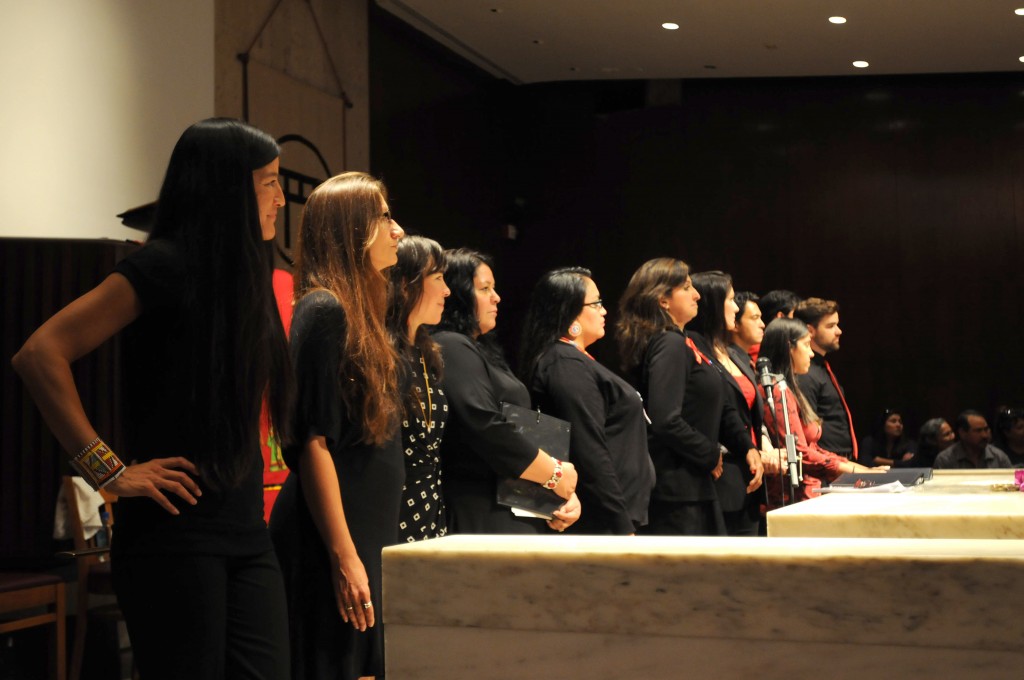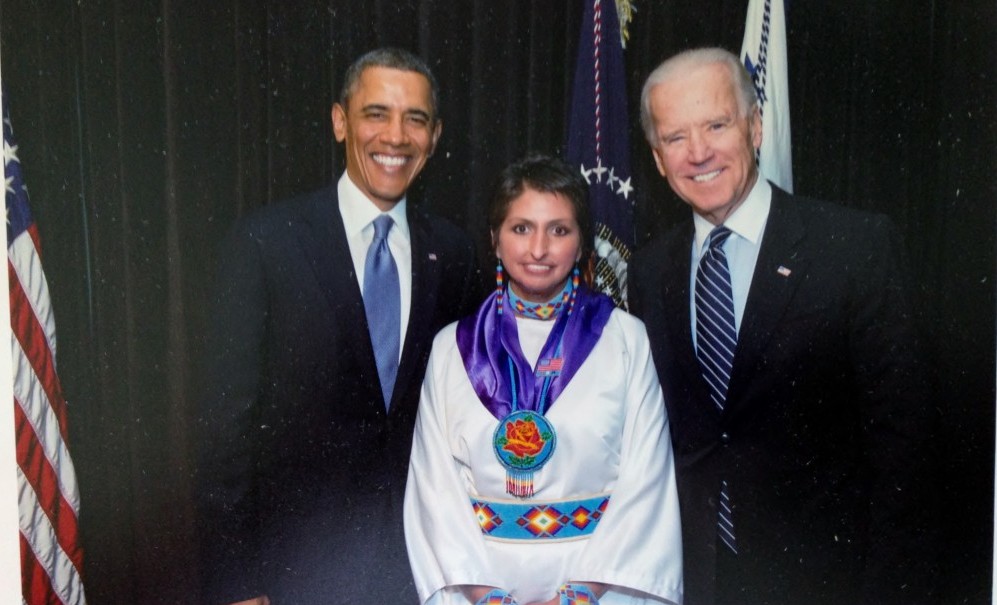Mary Kathryn Nagle is a playwright with a law degree. Accordingly, her work often arises from interviews and real-life legal dramas. Her play “Sliver of a Full Moon” came from interviews with Native women who have survived abuse. It examines the movement that led to the reauthorization of the Violence Against Women Act (VAWA) in March 2013.
In September 2014, “Sliver of a Full Moon” was read as part of the United Nations World Conference on Indigenous Peoples. A full video of the reading, which was broadcast on HowlRound TV, is available here. In addition, Yale Law School presented “Sliver of a Full Moon” on March 31, 2015.
Megan McClain spoke to Nagle about the piece and how investigative theater can effect social justice.
MEGAN MCCLAIN: How do you define investigative theater?
MARY KATHRYN NAGLE: My approach to investigative theater has always come from this idea that we’re all storytellers, and the best stories are the ones that come to you in the most raw form. I was really excited about the idea of allowing other people’s stories to shape whatever I’m writing and letting go of some of that control. Initially, all my plays were based off of interviews. I thought what I was doing was weird and not as high of an art form as those who made up characters and invented people to say things. This was before my exposure to the Public and the Civilians, which have been the two biggest influences on my writing in New York. I was in law school writing mostly investigative theater, but not knowing there was a whole world of artists doing that. I was out there floundering on my own.
“At first the piece is a reflection of the societal conversation. But at some point it becomes a catalyst.”
In the play I worked on in the R&D group, “Fairly Traceable,” it’s all based on real court cases that relate to climate change litigation. I’m making a legal point about a legal doctrine that I want everyone to understand, but I also want it to be true. So I’ve tried to stay very true to the timeline. But then you get to these moments where, in order for the dramatic arc and the conflict and the flow of the play to work, you’re like, “Okay, could this event have happened just one year earlier?” But no, it didn’t. In the middle of my rewrite, I’m questioning how true I need to stay to those dates and those actual events. Can I move things around a little bit, since this is a work of art? What do I lose when I change hardcore facts?
There is something very exciting about investigative theater that other types of theater don’t have. It’s based on truth, and so you can’t deny it. When you are trying to make a powerful statement about something, especially about the subjects in our country that people don’t want to talk about — like global warming, climate change, violence against women, sexual violence — they want to say, “Okay, this is an interesting play, it’s very dramatic, it really pulls my heart strings. But it’s overdramatized. It’s not quite real.” When they can’t say that — when an audience can’t escape, and they have to accept that everything they’re watching is real — I think there is a power in that. A power in knowing these stories are from real people.
MEGAN: What about “Sliver of a Full Moon?” Are you working with text verbatim from your interviews? Has it changed at all in the last year, in preparation for its presentation at Joe’s Pub and for the UN?
MARY KATHRYN: Yes, I did a complete rewrite. The monologues are still from the interviews of the survivors, and they perform onstage reading their own words. Then there are these choral moments, when all three women come onstage and share words together. For those moments, I made up their lines. A lot of them were inspired by things they said in their interviews.
With their own monologues, I kept it very close to their own words. There was something sacred about it. I didn’t want to mess with the power they have.
MEGAN: You wrote the first version in response to the VAWA, which passed unexpectedly in 2013. Has the conversation changed since that time? And do you see the script furthering conversations about the violence against women?
MARY KATHRYN: That’s a really exciting question, in terms of investigative theater. Because when it’s truly investigative, the play is never done. The conversation goes on. At first the piece is a reflection of the societal conversation, but at some point, it becomes a catalyst. And I hope and pray that that’s where we are now with “Sliver of a Full Moon.”
But the way it first started was, before the bill passed, several leaders came to me and said, “This bill is not going to pass the House. Can you write a play, and we’ll perform it on the steps of the capitol?” They introduced me to several women who were willing to share their stories, and as we were getting ready to do the interviews, the bill miraculously passed. We all were shocked. It was a total miracle. My main question was, “Do we still need to do this play?” Everyone said, “Yes we need to celebrate our victory.”

What’s exciting about investigative theater is it is very empowering in ways that other kinds of theater are not. When you are telling someone’s real story, you open the door for them to come and engage with the audience. Some of the women I interviewed wanted to share their stories, some wanted to come and sit in the audience and watch an actress play their part, and some wanted to get onstage afterwards to answer questions. It presents a wide spectrum of ways they can be empowered. It’s a vehicle for getting stories out there that otherwise no one would hear. More recently, we started talking about how it’s only a partial victory. The act only restores jurisdiction in tribes over protection orders, domestic violence in the home and dating violence. It doesn’t cover rape, murder, sexual assault. So non-Natives can still go onto tribal lands, murder someone, rape someone, and the tribe has no jurisdiction to do anything. And thanks to the congressional delegation from Alaska, 228 tribes in Alaska were carved out of VAWA 2013. Because VAWA will be up for reauthorization in 2018, “Sliver of a Full Moon” will include an Alaska monologue. I spent a week in Alaska this summer interviewing women. Now the play really focuses on how, yes, March 2013 was a victory, but why was Alaska excluded?
MEGAN: I love that before the VAWA passed, tribal leaders came to you and said, “write a play.” That story was the weapon that could change minds. What do you think it is about theater or storytelling that still holds that power?
MARY KATHRYN: It’s the most powerful thing I think we have as a weapon for good. Because, as humans, we need stories. They’re medicine to us. They’re medicine to our souls, and that’s why the spaces like the 9/11 Memorial are important, because it is a storytelling place. You go in there, and everything you are exposed to is a story. It’s sharing human stories that helps us grieve. Stories also connect us. I’ve seen the power of story, and it’s amazing. It changes people’s lives, and I’ve seen it change people’s hearts.
MEGAN: Have any of your investigations surprised you in a way you didn’t expect?
MARY KATHRYN: It doesn’t surprise me anymore, but when I first started doing interviews, I was surprised at how powerful people’s own words are. The monologues that the women give in “Sliver of a Full Moon,” I didn’t write that part. It’s their words. People might think or assume that I heard an interview and thought, “Oh, this is a great story, I’m going to make it sound really beautiful and patch it up.” But I did not. It’s beautiful when you realize everyone is such a powerful storyteller. Not everyone is able to type out a play, but the power of story within each of us is amazing.
 Mary Kathryn Nagle was born in Oklahoma City, Oklahoma, and is a citizen of the Cherokee Nation of Oklahoma and an honorary member of the Ponca Tribe of Nebraska. She graduated summa cum laude from Tulane Law School, where she was the recipient of the Judge John Minor Wisdom Award. Her play “Manahatta” was recently featured in the Public Theater’s inaugural PUBLIC STUDIO workshop production series. Other recent productions include AMERINDA’s presentation of “Miss Lead” at 59e59. Nagle is an alum of the 2013 Emerging Writers Group at the Public Theater and an alum of the Civilians 2014 Research & Development Group, where she developed her play, “Fairly Traceable.”
Mary Kathryn Nagle was born in Oklahoma City, Oklahoma, and is a citizen of the Cherokee Nation of Oklahoma and an honorary member of the Ponca Tribe of Nebraska. She graduated summa cum laude from Tulane Law School, where she was the recipient of the Judge John Minor Wisdom Award. Her play “Manahatta” was recently featured in the Public Theater’s inaugural PUBLIC STUDIO workshop production series. Other recent productions include AMERINDA’s presentation of “Miss Lead” at 59e59. Nagle is an alum of the 2013 Emerging Writers Group at the Public Theater and an alum of the Civilians 2014 Research & Development Group, where she developed her play, “Fairly Traceable.”
Author
-

Megan McClain is the R&D Program Director for the Civilians and leads the writers, directors, and composers of the R&D Group. As a former Civilians Literary Associate, she worked on "The Way They Live" and "The End and the Beginning" at The Met. She is a staff member at The Lark and also serves as the Resident Dramaturg for Superhero Clubhouse, an ensemble creating original works at the intersection of ecology and theater. She has developed new theatrical work presented during artist residencies granted by The Metropolitan Museum of Art, The Drama League, NACL Theatre, Catwalk Institute, Stony Brook University, Lacawac Sanctuary, and the Lower Manhattan Cultural Council. She has provided dramaturgical support and literary work for productions and projects at numerous organizations including The Goodman Theatre, Disney Theatrical, Hartford Stage, PoNY, Playwrights Realm, The Lark, LMDA, Target Margin, Jewish Plays Project, New Georges, PlayPenn, and American Players Theatre. M.F.A Dramaturgy: University of Massachusetts Amherst.
View all posts









